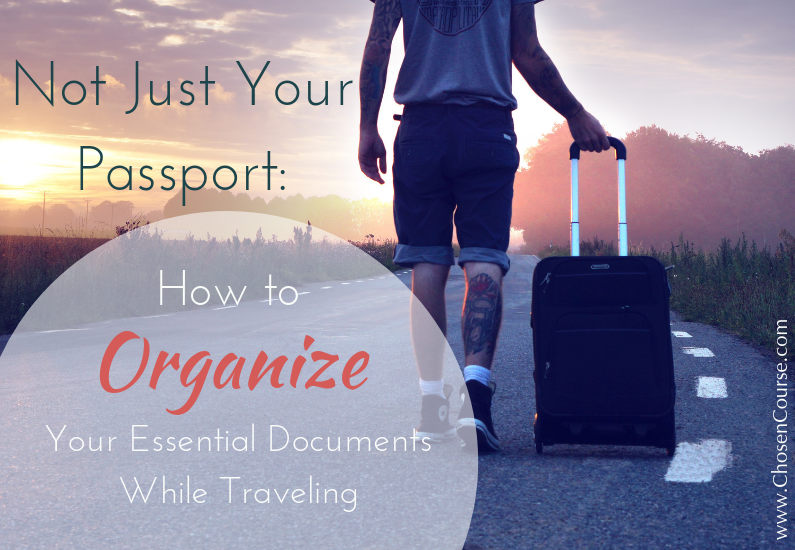When we decided to hit the road as full-time digital nomads, it finally became time to shift our systems fully into paperless (or as paperless as humanly possible.) I’ve written about moving toward “paper-less” organizational systems for years, but this became a flexion point when our last few paper filing systems needed to be jettisoned and altered.
Now, for those of you who are already full-time digital nomads you have probably already figured out some of these systems for yourselves. However, there still might be a few tricks and ideas here that you either haven’t considered or implemented… OR that might save your a** in case of an unexpected emergency, so you’ll want to read on.
For those of you who are location-independent, part-time travelers, you’ll be able to consider what’s essential to bring with you on your extended trips vs. what’s better to leave at home.
To make this easier, I’ll take you step-by-step through the different types of documents and discuss some good options for making sure that:
- You have what you need during your travels and in case of emergencies.
- You have backups of important information in case you lose your bag or stuff gets stolen.
Let’s dive in and consider how to make accessing your key information easier while traveling:
Your Passport, Visa Docs, Identification
If you’re traveling anywhere, then the most important docs to have with you are your passport, visa paperwork, driver’s license, and any similar identification paperwork. This should be obvious… duh, Herbie.
I will acknowledge that when I traveled for 4 months through 18 countries in Europe, I wore a slim body pouch that I could tuck these items (and a bit of cash and a spare credit card) under my clothes. At the time (almost 2 decades ago) this was considered the “safe” choice, and it still can be since even if your bags get stolen you’ll have your critical items. However, I know a lot of nomads balk at this idea as a “necessity.” Depending on where you are, it probably isn’t, and while I do have a similar “exercise-style” pouch I wear today, really it’s because I’m a toddler mom and it gives me a brainless place to keep my keys and phone when I’m living in yoga pants (*sigh* no pockets).
Having some smaller bag, pouch, or pack that keeps what’s mission critical near by can still be a smart choice if not for safety reasons, then for simplicity and peace of mind. But, you do you, as they say.
Regardless of where you keep your ID docs, then non-obvious smart step is to make 2 sets of photocopies of these documents.
Keep one set of copies somewhere separate from your originals (i.e. one in your backpack and another in your duffel bag or one in your bag at your hostel/home and one in your daypack or vehicle that you carry with you.) Then, make sure that someone trusted back home has another set of photocopies. If you are truly screwed and in a foreign country, then you’ll want to have someone “back home” who can help you get the info you need and work with your embassy to replace these critical documents if necessary.
Your Vital Documents
- Birth Certificates – for all family members
- Marriage Certificate
- Divorce Decree
- Adoption Decree
- Social Security Cards (for Americans or the equivalent in your country of origin)
- Death Certificates (for any family member for whom you were responsible for their estate)
If you’re a full-time digital nomad, then you might want to take the time to get two official copies of all these documents. Have one official copy that travels with you, and a 2nd copy that stays behind with a trusted friend or family member (preferably in a fire-proof safe.) If you don’t get official duplicates, then at least make sure that you leave a photocopy of any vital document behind with someone trusted, so that you have a leg up if you should ever have to replace that document.
If you’re only a part-time traveler, then you might switch this plan and bring the photocopies with you while leaving the official copies behind. Why? Because you’d be surprised the situations when having your birth certificate (or that of your child) might save a LOT of headaches either with immigration, an airline, a hospital in case of an emergency, or other official institution (like a bank or insurance company) in case of some major personal disaster.
Medical Records
- Insurance card or proof of insurance (Medical & travel)
- Prescriptions (medications, birth control, glasses, contacts, etc)
- Vaccination Records (for all family members)
- Key Medical documents (Copies of Physical therapy exercises, Specialist Referrals, Diagnosis or medical history documents)
- Medical Proxy (if you’re incapacitated, then who’s empowered to make medical decisions for you)
Similar to the vital documents above, these are key records that you definitely want to have access to while you travel. What happens if you need to find a doctor on the road (as I have for help with Chiropractic or PT)? What if you break your glasses or need some more contacts? We recently signed our daughter up for school and had to provide her updated vaccination records for the school files. All of these documents are a fairly normal part of our lives, but we don’t think about them until we really need them.
Depending on your comfort level, you can take photos of some of these and keep this information digitally either in a secure encrypted storage tool like LastPass or just photos/scans of the important pieces in Evernote or Dropbox/Google Drive/OneDrive. Other documents you’ll want to bring originals (like prescriptions) with you and perhaps leave photocopies behind with that same trusted person.
Insurance Documents
- Proof of Insurance cards
- Insurance Policy documents
Above we discussed medical insurance, but what about renter’s insurance or similar coverage for your belongings while traveling. Or, if you’re RVing, or traveling primarily by car then auto insurance. Having lived for years in Massachusetts which doesn’t require drivers to keep “proof of insurance” cards in the vehicle, we had to make sure to print a copy of that document to put in our car’s glovebox.
Similarly, I remember traveling years ago and having a variety of items stolen from me in Venice, Italy. You bet I was glad to have access to my Renter’s Insurance information so that I could file a claim and get reimbursed for those losses. Digital copies of these documents are likely fine, but you’ll want to be able to quickly access them in case of a loss or an accident.
Financial Documents
- Credit Cards
- Bank Accounts/Statements
- Checkbooks
- Investment Accounts/Statements
- Bills
Before leaving home you might want to make photocopies of your credit cards (or any card you keep in your wallet) and leave those behind with that same trusted friend. Otherwise, you might want to take the time to add all your credit card numbers (and emergency contact numbers) to a secure online vault like LastPass. If your wallet is stolen, then you’ll want to be able to get access to your account information to have the appropriate holds put on your cards.
Depending on where and for how long you’re traveling, you also might want to bring your checkbook and extra checks with you. Since we’re staying primarily in the US thus far (due to restrictions from Brian’s work), checks have been very helpful when paying local house-cleaners or nannies. Some are happy to use PayPal or Venmo, but not everyone.
Similarly, you might want to add all your bank checking, savings, and investment account information to a secure digital vault or make a list of that information to leave with your trusted friend too. While most full-time nomads or location-independent entrepreneurs have already embraced online bill paying and money transfers… god forbid, what if you got hit by a crazy tuk tuk driver in Bangkok, and someone had to figure out your estate details. That list of information would be a good place to start.
Business Documents
- Articles of Incorporation
- Business Licenses
- Business Insurance
- Tax ID Information
Sometimes you need these items, just like your personal birth certificate, to prove your business identity. I can remember once having to open up a new merchant account while traveling (pre-nomad launch), and scrambling around trying to find the “proof” documents for my business that they needed to set up the new account. This information can probably be stored digitally in a combination of LastPass and Evernote.
Estate Documents
- Wills
- Durable Power of Attorney
- Trust Docs
- Guardianship Docs (for your children)
- Advanced Medical Directive
I know… many of these documents you might not even have. But, honestly, it might be a good time to get them done, or plan to get them done next time you’re “home”. Disasters and accidents happen everywhere in the world, and having your legal and financial “house in order” can save your loved ones enormous headaches in bitterly terrible circumstances.
When I was 8 months pregnant we decided it was time to take care of all this estate stuff. We wanted to make sure that all the appropriate documents were in place to take care of our Pumpkin if we were in a car accident or some other horrible disaster, and that our wishes were clear for her guardianship.
While you will hopefully never have to produce these documents during your travels, you definitely will want to know that they exist and ensure that your trusted someone knows where they are and has access to them in case of an emergency.
User Manuals
Going from drama-filled estate docs to User Manuals is a huge downshift, but you’d be surprised how many times we’ve wanted to double-check something (like the height/weight limit on Pumpkin’s car seat). The good news is that most of these items can be found online, but you might want to take the time to consider which ones are essential to you and download copies into your Evernote or Dropbox/GDrive/OneDrive account so you can access them from anywhere.
You probably don’t want to take up precious space in your world with these bulky items, but having easily accessed digital copies can be very helpful.
How to Store Your Documents
We put all our important documents into a zippered accordion portfolio, which allows me to worry less about something falling out and being misplaced. Each category of item has a labeled section (passports, vital documents, medical docs, checkbooks, etc).
Then, we also put a label on the outside of the portfolio that says “If found, please call XXX-XXX-XXXX.” If you’re traveling internationally, then you might want to switch that for your email address. But, working on the assumption that MOST people are good humans, you want to increase the odds that your portfolio gets back to you if it were ever misplaced. That’s why it’s smart to have some clear way for the finder to contact you and arrange for its return.
The essentials you leave behind “at home” ideally would be in a fireproof safe either:
- In the home of your trusted someone
- In your storage area with your trusted someone having the keys/access code.
If you’re also storing information digitally, then set up the appropriate systems using a combination of:
- A highly secure encrypted storage such as LastPass for data like passwords, account information, social security numbers, bank account information, photos of vital docs, etc.
- An easily accessible/sharable digital storage like Evernote or Dropbox/GDrive/OneDrive- for User Manuals, Insurance Policies, etc.
I’ll be covering more about the “how” of structuring these types of digital systems in the course that I’m launching Fall 2019:
The Freedom Evolution:
The Five Elements You Need
For the Business & Lifestyle You Deserve
If you’d be interested in hearing more about the course, then make sure you add your name to the waitlist so you can find out about The Freedom Evolution when we’re closer to launch.
For a video tour of our physical travel file system, take a look at this Facebook Live:



